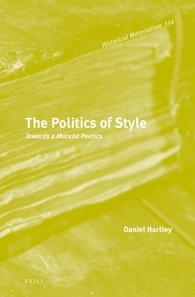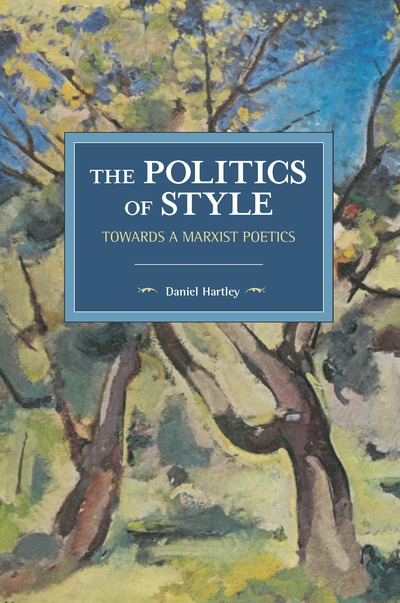Daniel Hartley, University of Leeds
This book develops a Marxist theory of literary style. The first part explains why Raymond Williams, Terry Eagleton and Fredric Jameson came to see style as central to political criticism. It delineates the historical and conceptual preconditions for the emergence of a ‘politics of style’, and uncovers an underground current of stylistics within the Marxist tradition from Marx to Barthes. The second part sets out precisely what each thinker has written on style and demonstrates how this came to figure in their overall intellectual and political projects, focusing above all on a detailed reconstruction of Williams’s best-known concept, the ‘structure of feeling’. Finally, the third part sets out an independent theory of style and makes an ambitious attempt to establish it as a foundational element of a new Marxist poetics.
Biographical note
Daniel Hartley (Ph.D., 2014) studied at the University of Cardiff, the Universiteit van Amsterdam, and Justus-Liebig-Universität Giessen. He is currently Postdoctoral Fellow in the School of Languages, Cultures and Societies at the University of Leeds. He has published widely on Marxist theory and contemporary literature.
Readership
The Politics of Style: Towards a Marxist Poetics will appeal to scholars and students of literature, cultural theory, and Marxist thought.
Reviews
“From now on, anyone entering the field of Marxist literary theory will have to take account of Daniel Hartley’s seminal work. He is Raymond Williams’s true successor, and he has gone further than his master, by developing Williams’s intuition of style as a social relationship into a comprehensive and systematic theory of literary style. In so doing, he has solved the conundrum posed by the concept of style, the contradiction between its collective (rococo style, modern style, etc.) and its irredeemably individual (le style c’est l’homme) characteristics. This is his first book, but it is already a monument.”
– Jean-Jacques Lecercle, Professor of English at the University of Paris at Nanterre
***
“Hartley’s is an innovative and ambitious attempt to ground Marxist aesthetics in the micropoetics of style study and linguistic analysis. Williams certainly comes off better here than Eagleton or myself; but too bad for us! The book produces timely new problems and proposes impressive new (or renewed) projects. Its intelligence and energy mark Hartley’s as an authoritative new voice and reinvigorate a Marxist literary criticism too often pronounced unfashionable in the postmodern era.”
– Fredric Jameson, Knut Schmidt-Nielsen Professor of Comparative Literature and Romance Studies
Table of contents
Acknowledgements
Introduction
PART I: MARXIST POETICS IN CONTEXT
1. Why Marxism And Style?
1.1. The Concept Of Style
1.2. Epochal Political Conjuncture: Western Marxism And Beyond
1.3. Intellectual Context: The British Anomaly
1.4. Internal Debates: Types Of Marxist Criticism
2. From State Censorship To The Poetry Of The Future: Style In The Marxist Tradition
2.1. An Overview Of Marx’s Early Writings
2.2. Style In Aristotle’s Rhetoric
2.3. The Young Marx On Style And Censorship
2.4. Marx After Buffon And Fichte
2.5. Style And The Philosophy Of History
2.6. The End Of Style?
3. Mimesis From Plato To Ricoeur
3.1. Mimesis In Plato And Aristotle
3.2. On The Threefold Mimesis
3.3. Historicizing The Threefold Mimesis
Conclusion
PART II: THEORIES OF STYLE IN WILLIAMS, EAGLETON AND JAMESON
Overture: Patricide; Or, Reformism Versus Revolution
Eagleton Contra Williams
Williams Strikes Back
4. Style In Prose Fiction: A Preliminary Definition
4.1. Style As A Social Relationship
4.2. Narratology, Voice And Style
4.3. A First Definition Of Style In Prose Fiction
4.4. Possible Elaborations
5. Raymond Williams: Style Between Immanence And Naturalism
5.1. On Williams And Immanence
5.2. Williams’s Multiple Approaches To The Problem Of Style
Conclusion
Intermezzo: Style And The Meaning Of ‘Politics’ And ‘Culture’
Eagleton Contra Jameson
Jameson’s Reply
6. Terry Eagleton: The Political Theology Of Style
6.1. The Body As Language
6.2. Leavis 2.0?
6.3. The Close Reading Of Styles
6.4. The Problems Of Stylistic Ideals
6.5. Tragic Styles
7. Fredric Jameson: Epic Poet Of Postmodernity 176
7.1. Narrative And Praxis
7.2. Jameson As Epic Poet Of Postmodernity
7.3. Jameson, The Epic Contemplator?
7.4. Style And Modernity
7.5. Postmodernity And The End Of Style
7.6. Jameson’s Theory Of Style: A Balance-Sheet
Coda: New Styles For New Social Relations
PART III: STYLE IN MARXIST POETICS
8. A General Marxist Theory Of Style
8.1. Mimesis1
8.2. Mimesis2
8.3. Mimesis3
8.4. Poiēsis And Praxis
Conclusion
Bibliography
Index


